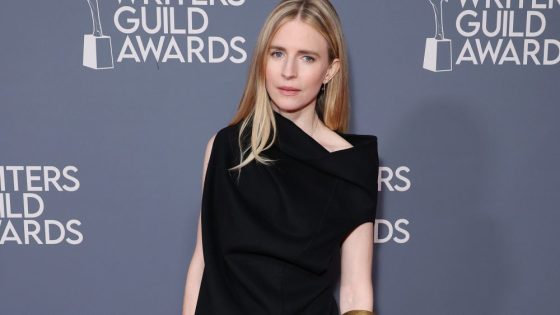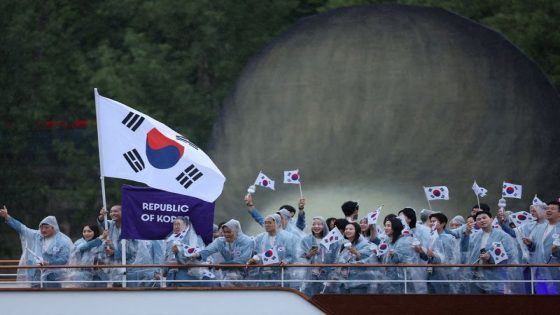The billionaire Andy Ronson (Clive Owen) — a technological genius who serves as an antagonist and, ultimately, tragic figure in the FX limited series “A Murder at the End of the World” — may bear a more-than-passing resemblance to certain tycoons of our time. But co-creator, director and co-star Brit Marling, who conceived the show with her longtime collaborator Zal Batmanglij, had an older inspiration in mind.
“If anything, I think we were pretty influenced by reading about Disney, and the idea of Walt Disney as a figure who made real leaps in original thinking,” Marling explains in a conversation with Variety’s Awards Circuit podcast. “A Murder at the End of the World” is certainly critical of technology, but Marling and Batmanglij also wanted to present a more nuanced narrative than resolving its classic whodunit plot with a single diabolical billionaire.
“There are a lot of narratives that want to make the easy answer that this tech billionaire, this corporate CEO, this person is the bad guy, and if we can just find the one bad guy and exile that person from the system, we’ll all be saved,” Marling observes. “And I think it’s a lot more complicated than that.”
Listen below to this episode of the Awards Circuit podcast, which also features a conversation with “Parish” star and executive producer Giancarlo Esposito.
“A Murder at the End of the World” follows amateur investigator Darby Hart (Emma Corrin), author of a hit true crime memoir, to Ronson’s rural retreat in Iceland. There, she briefly reunites with her ex-boyfriend Bill (Harris Dickinson), who once worked with her to track down a serial killer before becoming a world-famous artist. But when Bill ends up dead just as a storm cuts off their hotel from the outside world, Darby starts sleuthing. It’s a quest that leads her to bigger questions about wealth hoarding, artificial intelligence and collective culpability. Without spoilers, the culprit turns out to be a clever twist on the Agatha Christie-inflected template the filmmakers best known for Netflix’s “The OA” put their characteristically cerebral spin on.
“I don’t know if it’s useful for the answer to the whodunit anymore to be a single person,” Marling says. “I think it’s more about systemic convergences of things. Who are we allowing to have power? And what are we inviting in? And how are we all complicit in it? Because we are, at this point, all complicit.”
Marling is a fan of both Christie’s novels and other classics of the genre, including Owen’s previous star turn in Robert Altman’s “Gosford Park.” With “A Murder at the End of the World,” she and Batmanglij fused the classic format with the more contemporary craze for true crime. “It isn’t a genre that I know that deeply or intimately, but I do understand the impulse for it,” MarIing speculates. “I think the draw is that modern life feels a little bit like a whodunit. We’re in a really strange time, and things are very fucked up. And I think we’re all looking around and being like, ‘Okay, who’s to blame for this?’”
Though she typically plays the lead role in her projects with Batmanglij, to bring Darby’s story to life, Marling cast herself in a supporting role (as Andy’s wife and Darby’s hacker role model, Lee) and used the extra bandwidth to step behind the camera as a director for the first time in her career. “I’m so glad that I did that, because it was really satisfying to get to take things from the imagination onto the page, and then from on the page to on the screen through the edit,” Marling reflects. “Sometimes there’s a gap between what you’d want and what you were able to achieve. But it is a real pleasure to be able to do that. Because when you don’t do that, as a writer, you’re surrendering a lot. You just have to practice the art of surrender, you know?”
“A Murder at the End of the World” ends in a definitive fashion. But from Hercule Poirot to Benoit Blanc, the most iconic private detectives transcend individual stories, taking their talents across locales. When asked if she and Batmanglij envision a similar future for Darby Hart, Marling seems open to the idea. “We thought of this story as having a very specific beginning, middle and end,” she says. But I think we also thought, ‘This Darby has become quite a vivid character. So if the audience appetite is there, and our appetite is there, and we feel a sense of a new story that we could tell — I think you’re right, that Darby Hart could travel all over the world. We could find her anywhere next.”
Variety’s “Awards Circuit” podcast, hosted by Clayton Davis, Jenelle Riley, Jazz Tangcay, Emily Longeretta and Michael Schneider, who also produces, is your one-stop source for lively conversations about the best in film and television. Each episode, “Awards Circuit” features interviews with top film and TV talent and creatives, discussions and debates about awards races and industry headlines, and much more. Subscribe via Apple Podcasts, Stitcher, Spotify or anywhere you download podcasts.
Source Agencies


